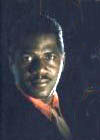Sliders cruises through another fun adventure here that only manages to rank in the lower part of average for season two. There are perhaps too many different ideas in play here, simply not getting tied together as well as possible.
It looks as though the main lawyer they talk to is the same chap they encountered on several worlds in "Into the Mystic" (story no. 10), but bizarrely none of the speaking roles from this section of the story appear in the credits. One wonders if this hook was originally shot for a different episode, and got spliced onto this one instead. Indeed, I regularly forget which episode this hook belonged to.
Mel Tormé, famous father of one of the creators of "Sliders", is also a nice feature in the story, fueling much of the intrigue and entertainment value in the first half. He is easily the most remembered element of this story. When the whole thing is over, however, one is left scratching one's head wondering where the writers were trying to go dramatically with half of his scenes, or how we can possibly believe what we've seen. Exactly what is the importance of this mysterious signal of his that he keeps telling people to wait for? Quinn has quite a bit of stuff to tackle proactively on his own in this tale, all of which is a side-tangent with motivation as clear as mud. Early on, the sliders find themselves with a hundred thousand dollars of bribe money from the mafia, and a lengthy discussion ensues of what this means and what they should do with it. Many ideas are bandied about, ending with a rant from the professor about how much he doesn't care what is eventually done with it. He adds several more options onto the pile, before collapsing into a chair, leaving the decision to the others. Rembrandt needs to stay put, to avoid being mistaken for his famous double. So suddenly, Quinn takes the initiative and the money, issues some instructions to the others, and runs off to a casino to give Mel Tormé some information. What he ever hoped to actually do with the money, and why, remains unclear throughout some very lengthy beats of losing it all and gambling to get it back. It doesn't seem to be remotely necessary to his mission of giving Mel Tormé information. I like the scenes of Quinn outsmarting the casino system very much, but the sequence inspires little emotional investment from the audience. This side plot also involves Quinn coming to the aid of a woman in distress - essentially a much weaker repeat of the situation previously played out in "El Sid" (story no. 14). In this case, the man can clearly be heard claiming that she stole money from him, and does not exhibit the violence or bad temper of Sid, making instantly obvious that one should not take sides in their dispute without digging deeper into the truth of their situation. Quinn's idiocy quickly puts him into the same situation as the man, as he later has to come in and grab same woman, demanding to know where his money went. He clearly judged that guy too quickly, paying no attention to the obvious warning signs. Worse, this story's ultimate attempt to create some kind of bond between Quinn and the female hustler falls completely flat, inspiring many a "What the heck?" and "Who cares?" out of the audience during the turning points of this subplot. The story's main concluding action sees all four sliders tied up in chairs at the villain's mercy, while local characters handle the final moves. No points for proactively solving their problems in this adventure, let alone anyone else's, although Rembrandt does give his double a bit of an assist. The sliders have pretty much been the pawns of the local characters all the way through this adventure, and Quinn still rates a zero on the hero meter, despite his earlier off-target efforts.
This story has become available on DVD. Click on the Amazon symbol for the location nearest you for pricing and availability:
Comments on this article are welcome. You may contact the author from this page:
|









